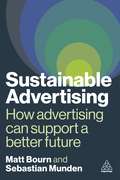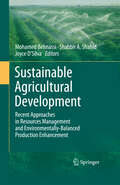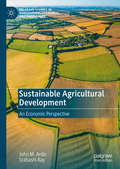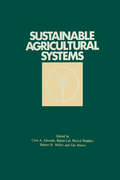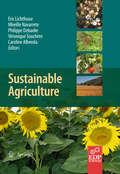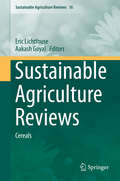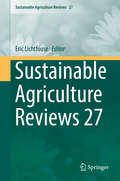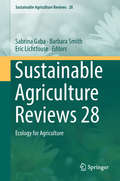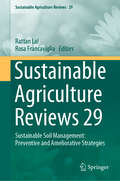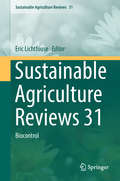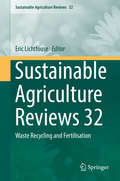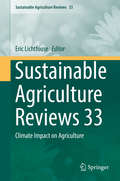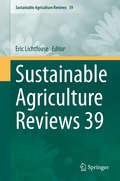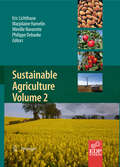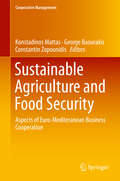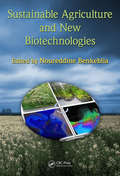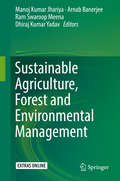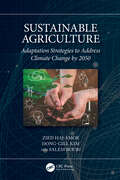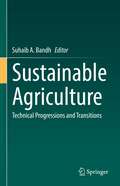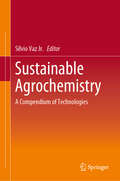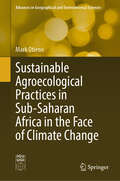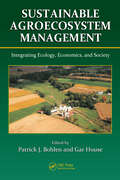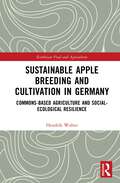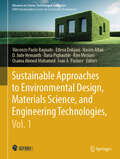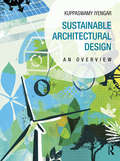- Table View
- List View
Sustainable Advertising: How Advertising Can Support a Better Future
by Matt Bourn Sebastian MundenSustainable Advertising is a manifesto for the world's advertising industry, a case for change globally: 'to change the way we work and to change the work we make'. This is the book every advertising and marketing professional needs to make every ad a sustainable ad.Sustainable Advertising informs every stage of the advertising process with the expertise required to make advertising more sustainable, future-proofing portfolios, improving productivity, and saving money. Covering the way ads are made and distributed, to the products, services, and behaviours they promote, this book sets out the insights, best-in-class case-studies and practical guidance to accelerate change and ensure the industry is fit for purpose in the face of the climate crisis.This must-read guide sets out a clear action plan for agencies, brands, media owners, tech platforms and individuals. It includes interviews with industry leaders including Unilever, WPP, Google, ITV, Cannes Lions, Meta, Havas, PwC, Tesco, Oxford University's Said Business School, the Advertising Standards Authority and dentsu. Learn how to avoid greenwashing, how to pitch more sustainable behaviour changes to appeal to the most customers and how advertising can make the most positive contribution to the global battle against climate change.
Sustainable Agricultural Development
by Shabbir A. Shahid Mohamed Behnassi Joyce D'SilvaDue to many challenges (i.e. climate change, energy, water and land shortage, high demands on food, land grabbing, etc.), agriculture production potential is expected to be seriously affected; thus, increasing food insecurity and hunger in many already affected regions (especially in Africa). In this context, sustainable agriculture is highly recommended as an eco-system approach where soil, water, plants, environment and living organisms live in harmony. Innovative technologies and research should be developed to ensure sustainable agriculture and productivity using modern irrigation systems, improved varieties, improved soil quality, etc. In the meantime, the preservation of natural environment should be based on resource conservation technologies and best management practices. Sustainable Agricultural Development, not only raises the serious ethical and social issues underlying these huge environmental problems, but also aims at presenting successful experiences from all over the world in relation with sustainable farming, sustainable management of water and land resources, and innovative processes in livestock production. It also aims at providing inputs to decision making processes and encouraging the transfer of relevant know-how, technologies and expertise to different countries where similar agro-climatic conditions may exist; thus saving precious resources and promoting sustainable agricultural development as a relevant approach to tackle the food security challenge. Finally, this book focuses on the paradigmatic and policy dimensions and call for an innovative approach by analyzing the key themes in a complex and interrelated manner.
Sustainable Agricultural Development: An Economic Perspective (Palgrave Studies in Agricultural Economics and Food Policy)
by John M. Antle Srabashi RayThis book provides a non-technical, accessible primer on sustainable agricultural development and its relationship to sustainable development based on three analytical pillars. The first is to understand agriculture as complex physical-biological-human systems. Second is the economic perspective of understanding tradeoffs and synergies among the economic, environmental and social dimensions of these systems at farm, regional and global scales. Third is the understanding of these agricultural systems as the supply side of one sector of a growing economy, interacting through markets and policies with other sectors at local, national and global scales. The first part of the book introduces the concept of sustainability and develops an analytical framework based on tradeoffs quantified using impact indicators in the economic, environmental and social domains, linking this framework to the role of agriculture in economic growth and development. Next the authors introduce the reader to the sustainability challenges of major agroecosystems in the developing and industrialized worlds. The concluding chapter discusses the design and implementation of sustainable development pathways, through the expression of consumers’ desire for sustainably produced foods on the demand side of the food system, and through policies on the supply side such as new more sustainable technologies, environmental regulation and payments for ecosystem services.
Sustainable Agricultural Systems
by Clive A. EdwardsA unique look at how the adoption of sustainable farming methods is being pursued throughout the world. This comprehensive book provides clear insight into research and education needs and the many points of view that come to bear on the issue of sustainability. Essential for agricultural leaders in research, education, conservation, policy making, and anyone else interested in creating an economically and environmentally sustainable agriculture worldwide.
Sustainable Agriculture
by Eric Lichtfouse Mireille Navarrete Philippe Debaeke Caroline Alberola Souchere VéroniqueSustainability rests on the principle that we must meet the needs of the present without compromising the ability of future generations to meet their own needs. Starving people in poor nations, obesity in rich nations, increasing food prices, on-going climate changes, increasing fuel and transportation costs, flaws of the global market, worldwide pesticide pollution, pest adaptation and resistance, loss of soil fertility and organic carbon, soil erosion, decreasing biodiversity, desertification, and so on. Despite unprecedented advances in sciences allowing to visit planets and disclose subatomic particles, serious terrestrial issues about food show clearly that conventional agriculture is not suited any longer to feed humans and to preserve ecosystems. Sustainable agriculture is an alternative for solving fundamental and applied issues related to food production in an ecological way. While conventional agriculture is driven almost solely by productivity and profit, sustainable agriculture integrates biological, chemical, physical, ecological, economic and social sciences in a comprehensive way to develop new farming practices that are safe and do not degrade our environment. In that respect, sustainable agriculture is not a classical and narrow science. Instead of solving problems using the classical painkiller approach that treats only negative impacts, sustainable agriculture treats problem sources. As most actual society issues are now intertwined, global, and fast-developing, sustainable agriculture will bring solutions to build a safer world. This book gathers review articles that analyze current agricultural issues and knowledge, then propose alternative solutions. It will therefore help all scientists, decision-makers, professors, farmers and politicians who wish to build a safe agriculture, energy and food system for future generations.
Sustainable Agriculture Reviews
by Eric Lichtfouse Aakash GoyalSustainable agriculture is a rapidly growing field aiming at producing food and energy in a sustainable way for humans and their children. Sustainable agriculture is a discipline that addresses current issues such as climate change, increasing food and fuel prices, poor-nation starvation, rich-nation obesity, water pollution, soil erosion, fertility loss, pest control, and biodiversity depletion. Novel, environmentally-friendly solutions are proposed based on integrated knowledge from sciences as diverse as agronomy, soil science, molecular biology, chemistry, toxicology, ecology, economy, and social sciences. Indeed, sustainable agriculture decipher mechanisms of processes that occur from the molecular level to the farming system to the global level at time scales ranging from seconds to centuries. For that, scientists use the system approach that involves studying components and interactions of a whole system to address scientific, economic and social issues. In that respect, sustainable agriculture is not a classical, narrow science. Instead of solving problems using the classical painkiller approach that treats only negative impacts, sustainable agriculture treats problem sources. Because most actual society issues are now intertwined, global, and fast-developing, sustainable agriculture will bring solutions to build a safer world.
Sustainable Agriculture Reviews 27 (Sustainable Agriculture Reviews #27)
by Eric LichtfouseThis book deals with a rapidly growing field aiming at producing food and energy in a sustainable way for humans and their children. It is a discipline that addresses current issues: climate change, increasing food and fuel prices, poor-nation starvation, rich-nation obesity, water pollution, soil erosion, fertility loss, pest control and biodiversity depletion. This series gathers review articles that analyze current agricultural issues and knowledge, then proposes alternative solutions.
Sustainable Agriculture Reviews 28: Ecology For Agriculture (Sustainable Agriculture Reviews #28)
by Barbara Smith Eric Lichtfouse Sabrina GabaThis book presents ecological principles and applications of managing biodiversity in agriculture to decrease pesticide use and produce safe food. Major topics include ecosystem services biological pest control, conservation agriculture, drought stress, and soil biodiversity, carbon and fertilisation.
Sustainable Agriculture Reviews 29: Sustainable Soil Management: Preventive and Ameliorative Strategies (Sustainable Agriculture Reviews #29)
by Rattan Lal Rosa FrancavigliaThis book addresses the threats that hamper the achievement of sustainable soil management: soil erosion by water and wind, soil organic carbon loss, nutrient imbalance, salinization, contamination, acidification, loss of soil biodiversity, surface sealing, compaction and water logging. The specific focus is on preventive and ameliorative strategies for sustainable soil management.
Sustainable Agriculture Reviews 31: Biocontrol (Sustainable Agriculture Reviews #31)
by Eric LichtfouseThis book presents advanced ecological techniques for crop cultivation and the chapters are arranged into four sections, namely general aspects, weeds, fungi, worms and microbes. Biocontrol is an ecological method of controlling pests such as insects, mites, weeds and plant diseases using other organisms. This practice has been used for centuries. Biocontrol relies on predation, parasitism, herbivory, or other natural mechanisms. Natural enemies of insect pests, also known as biological control agents, include predators, parasitoids, pathogens, and competitors.
Sustainable Agriculture Reviews 32: Waste Recycling and Fertilisation (Sustainable Agriculture Reviews #32)
by Eric LichtfouseThis book summarise advanced knowledge and methods to recycle waste and fertilise soils in agriculture. In the near future, waste recycling will no longer be an option because natural resources become rare and costly, urbanisation is blooming and population is growing. In theory, most waste could be recycled. In practice, most waste is wasted. Remarkable aspects include the concepts of waste hierarchy eco-houses in smart cities, microbes and fungi for plant nutrition, and benefits of legume cultivation, biochar application and agropastoralism.
Sustainable Agriculture Reviews 33: Climate Impact on Agriculture (Sustainable Agriculture Reviews #33)
by Eric LichtfouseThis book presents advanced knowledge on the relationships between climate change and agriculture, and various adaptation techniques such as low tillage, salt-adapted beneficial microbes and closed systems. Climate change is unavoidable but adaptation is possible. Climate change and agriculture are interrelated processes, both of which take place on a global scale. Climate change affects agriculture through changes in average temperatures, rainfall and climate extremes; changes in pests and diseases; changes in atmospheric carbon dioxide; changes in the nutritional quality of some foods; and changes in sea level.
Sustainable Agriculture Reviews 39 (Sustainable Agriculture Reviews #39)
by Eric LichtfouseThis book reviews recent research advances in sustainable agriculture, with focus on crop production, biodiversity and biofuels in Africa and Asia.
Sustainable Agriculture Volume 2
by Eric Lichtfouse Marjolaine Hamelin Mireille Navarrete Philippe DebaekeThis book gathers review articles that analyze current agricultural issues and knowledge, then propose alternative solutions. It will therefore help all scientists, decision-makers, professors, farmers and politicians who wish to build a safe agriculture, energy and food system for future generations.
Sustainable Agriculture and Food Security: Aspects Of Euro-mediteranean Business Cooperation (Cooperative Management)
by Constantin Zopounidis Konstadinos Mattas George BaourakisThis book brings together research on cooperative management from the agriculture and food sector. By examining issues from food-policy, trade and environmental perspectives and presenting both methodological and empirical work, it allows readers to develop a deeper understanding of collective management processes and cooperative initiatives, and provides a theoretical background for promoting research in the various sectors in which market communities operate. On a more global level the offers insights into how to building powerful tools for decision making, particularly at a time when agriculture and the economy alike are affected by a volatile political, social and economical environment and are forced to undergo major structural changes.
Sustainable Agriculture and New Biotechnologies
by Noureddine BenkebliaTaking a broad and innovative informational approach, Sustainable Agriculture and New Biotechnologies is the first book to apply omic technologies to address issues related to understanding and improving agricultural sustainability in the food production process. The transformation from industrial to sustainable agriculture is discussed within the
Sustainable Agriculture, Forest and Environmental Management
by Ram Swaroop Meena Manoj Kumar Jhariya Arnab Banerjee Dhiraj Kumar YadavThe recent technologies for sustainable development and maintaining ecological integrity in the field of agriculture, forestry and environmental management for the green future. Describes the recent technologies and issues to generate awareness among the global scientific community towards sustainable development.Covers various eco-friendly approaches for successful management of soil, water, forest, agriculture, and other natural resources. Addresses the policy issues promoting conservation, protection and management of various natural resources. Presents the issues of climate change and sustainable strategies to combat such a mega event. The existence of life on the earth primarily depends upon the agriculture, forest and environment. The changing climate is imposing the multifaceted challenges in front of human civilization. The agroecosystem management practices and technologies leads to higher productivity with destruction of agricultural, forest and environmental habitat leading to soil-water-air pollution. Food and Agriculture Organization (FAO) plays a key role in the promoting research and developmental activities in various sectors to achieve the sustainable development goals under 2030 agenda. Gradual growth of science and technology has imposed a significant pressure on the different ecosystem. In this context, approaches such as sustainable agriculture, forestry and eco-friendly technologies need to be address across the world. Keeping view of these facts this book underlines scientific chapters dealing with the issues with proper explanation, and accompanied by illustrative diagrams, tables, database as required. The editors have tried to provide a brief scenario about the current issues related to the agriculture, forestry and environment. Therefore, the book would be a very useful resource for academicians, scientists, and policy makers of the related field.
Sustainable Agriculture: Adaptation Strategies to Address Climate Change by 2050
by Zied Haj-Amor Salem Bouri Dong-Gill KimEver-increasing population growth, combined with ongoing climate change signals that agriculture will face great challenges in ensuring global food security by 2050. Additionally, climate change-driven variations in mean sea level, wave conditions, storm surge, droughts, and river flows could have serious effects on agriculture and other sectors. Considering these factors and the extremely high value and necessity of agriculture worldwide, effective adaptation measures underpinned by reliable climate change impact assessments are essential to conserve soil and water resources and ensure food security. Sustainable Agriculture: Adaptation Strategies to Address Climate Change by 2050 provides a thorough examination of these issues, and presents in-depth analysis, practical case studies, and numerous examples of adaptation options throughout for various regions of the world.Features: Presents up-to-date, scientifically robust information on climate change projections in Europe, Asia, America, Africa, and Australia Provides pathways to sustainable agricultural options rather than just defining the climate change issue Includes case studies and practical examples throughout the world Presents a framework by which policymakers can begin implementing strategies for improving agricultural productivity
Sustainable Agriculture: Technical Progressions and Transitions
by Suhaib A. BandhThis book discusses a number of recent technological and methodological progressions in achieving sustainable agriculture. It covers innovative and economically viable techniques for growers, laborers, consumers, policymakers, and others working to develop food-secure and ecologically sound agricultural practices to benefit humans and the environment. The key topics addressed include the increasing role of biofertilizers in sustainable agriculture, green synthesized nanoparticles for higher crop production rates, eco-friendly plant-based pesticides as alternatives to synthetic/chemical pesticides, use of genomics for improved plant breeding practices, and the use of biochar to increase the water-holding capacity in soil. The book concludes with an overview of satellite-based soil erosion practices to monitor and control the harmful impacts of land degradation, and a discussion of long-term strategies to reduce crop losses due to pest and insecticide damage. The book will be of interest to students and researchers in the field of environmental science, agriculture science, agronomy, and sustainable development.
Sustainable Agrochemistry: A Compendium of Technologies
by Sílvio Vaz Jr.This book presents a broad range of technologies for sustainable agrochemistry, e.g. semiochemicals for pest management, nanotechnology for release of eco-friendly agrochemicals, and green chemistry principles for agriculture. It provides a concise introduction to sustainable agrochemistry for a professional audience, and highlights the main scientific and technological approaches that can be applied to modern agrochemistry. It also discusses various available technologies for reducing the negative impacts of agrochemicals on the environment and human health.
Sustainable Agroecological Practices in Sub-Saharan Africa in the Face of Climate Change (Advances in Geographical and Environmental Sciences)
by Mark OtienoThis book emphasizes the critical importance of agroecological practices as a response to the climate crisis in sub-Saharan Africa. It explores the intricate relationship between agriculture, ecosystems, and climate, advocating for the transformation of farming systems to ensure long-term sustainability. Through research, case studies, and practical examples, the book showcases the potential of agroecology in addressing the impacts of climate change. Sustainable practices such as biodiversity conservation, resource preservation, soil fertility enhancement, and greenhouse gas emission reduction are extensively discussed, providing readers with a comprehensive understanding of the topic.The book also highlights success stories from various countries in sub-Saharan Africa, aiming to inspire farmers, policymakers, and practitioners to adopt and sustain change. It acknowledges the vulnerabilities faced by smallholder farmers in the region and emphasizes the integration of traditional knowledge with scientific advancements. This integration is seen as essential in providing farmers with the necessary resources, information, and capacity-building opportunities to adapt to changing climatic conditions. The book emphasizes the need for collaboration and innovation among governments, research institutions, civil society organizations, and local communities to promote sustainable agricultural development.Ultimately, the book advocates for sustainable agroecological practices as a means to achieve food security, enhance ecosystem resilience, and foster rural development in sub-Saharan Africa. By adopting climate-friendly agricultural approaches and maintaining ecological balance, it envisions a future where communities thrive, ecosystems flourish, and the impacts of climate change are mitigated.The target audience for this book includes students, agroecology experts, farmers, policymakers, and agricultural practitioners who are interested in the subjectmatter.
Sustainable Agroecosystem Management: Integrating Ecology, Economics, and Society
by Patrick J. Bohlen Gar HouseSustainable Agroecosystem Management: Integrating Ecology, Economics, and Society examines the challenges for developing integrated approaches to the management of agricultural ecosystems. Providing historical background of attempts to bridge the ecological and agricultural sciences, this book highlights recent efforts to integrate natural and social science perspectives. Through various case studies with global applications, the text explores practical innovative strategies, policies, and research needs for emphasizing whole system productivity, diversification of agricultural operations, and management of agricultural systems that sustain multiple functions including ecological integrity.
Sustainable Apple Breeding and Cultivation in Germany: Commons-Based Agriculture and Social-Ecological Resilience (Earthscan Food and Agriculture)
by Hendrik WolterApplying a socio-ecological framework, this book explores how the innovative approach of commons-based organic apple breeding can contribute to sustainability in agricultural and food systems more widely. As fruit breeding and cultivation systems are confronted with a range of sustainability challenges, there are calls for new and innovative breeding approaches beyond mainstream economic solutions that would mitigate these sustainability challenges. Apples, in particular, are facing serious environmental challenges, with the negative environmental impacts of modern conventional breeding and farming, loss of agrobiodiversity, low participation and diminishing diversity of market actors in the wake of privatization and economization trends result in a lack of resilience in current breeding and cultivation systems. Drawing on in-depth case study research on apple production in Germany, this book advances the innovative solution of commons-based apple breeding as a model for developing resilience in fruit breeding and cultivation. It analyzes this approach, comparing it with more conventional practices, and showcases which factors could inhibit the broad implementation of commons-based apple breeding and how they can be overcome to exploit its full potential. Contributing to the great ambition of finding sustainable solutions across all agricultural sectors, this book opens up new and interdisciplinary perspectives on fruit breeding and cultivation, which is a largely neglected issue in contemporary discussions on agriculture and food production. This book will be of great interest for students and scholars from the fields of sustainable food systems, sustainable agriculture, crop science, and resource management and in particular those that seek inspiration for innovative approaches rooted in sustainability research, social-ecological resilience, and the commons.
Sustainable Approaches to Environmental Design, Materials Science, and Engineering Technologies, Vol. 1 (Advances in Science, Technology & Innovation)
by Ivan A. Parinov D. Jude Hemanth Hasim Altan Ilaria Pigliautile Etleva Dobjani Vincenzo Paolo Bagnato Rim Meziani Osama Ahmed MohamedThis book highlights the sustainable innovation in environmental design, materials science, and engineering technologies. It provides a multidisciplinary approach to addressing contemporary challenges in creating resilient, efficient, and health-promoting built environments. With contributions from leading experts, the book covers a wide range of topics including architectural design, urban planning, sustainable materials, and renewable energy technologies. Also, it explores sustainable solutions and innovative practices across a range of disciplines essential for the future of our built environment. It examines architectural design, urban planning, and infrastructure, highlighting approaches that promote resilience and efficiency in urban settings. The book aligns with sustainable development goals, providing practical insights and strategies to achieve global sustainability targets. This book focuses on sustainable methodologies in material sciences, exploring the latest advancements in eco-friendly materials and their applications in construction. The integration of renewable energy technologies is thoroughly examined, showcasing how these innovations can reduce environmental impacts and enhance energy efficiency. Additionally, the book addresses the crucial theme of environmental integration and impacts, presenting comprehensive studies on the intersection of engineering technologies with environmental sustainability. Furthermore, it is an indispensable resource for professionals, researchers, and students dedicated to fostering sustainable development across multiple fields. It offers valuable guidance on implementing sustainable practices to create a healthier and more sustainable world.
Sustainable Architectural Design: An Overview
by Kuppaswamy IyengarThis book is a guide to a sustainable design process that moves from theory, to site and energy use, to building systems, and finally to evaluation and case studies, so you can integrate design and technology for effective sustainable building. Kuppaswamy Iyengar shows you how to get it right the first time, use free energy systems, and utilise technologies that minimize fossil fuel use. Each chapter has a sustainable design overview, technical details and strategies marked by clear sections, a summary, and further resources. Heavily illustrated with charts, tables, drawings, photographs, and case studies, the book shows technologies and concepts integrated into cohesive project types, from small and large office spaces to single and multiuse residences, hospitals, schools, restaurants, and warehouses to demonstrate implementing your designs to meet clients' needs now and for the future. Includes an overview of alternate assessment and evaluation systems such as BREEAM, CASBEE, GBTool, Green Globes alongside LEED, ECOTECT, energy 10, HEED and eQuest simulation programs. The guide reveals the importance of the building envelope—walls, superstructure, insulation, windows, floors, roofs, and building materials—on the environmental impact of a building, and has a section on site systems examining site selection, landscape design, thermal impact, and building placement.
